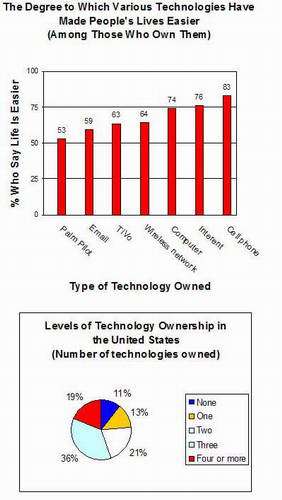Cell phone survey shows love-hate relationship
More than 80 percent of cell phone users say the device has made their lives easier, a new University of Michigan survey shows. But 60 percent say that public use of cell phones has disturbed or irritated them.
Preliminary findings from the survey, one of the first comprehensive studies to explore social attitudes toward cell phones and other information technology devices, were released today at the annual meeting of the Cellular Telecommunications and Internet Association in New Orleans.
"These findings suggest that Americans have mixed feelings about cell phone use, which has become an almost inescapable part of contemporary life," said Michael Traugott, U-M communications studies expert and senior research professor at the U-M Institute for Social Research.
Forty-two percent of the nationally representative sample of 752 Americans age 18 and older said that there should be a law that prohibits people from talking on cell phones in public spaces such as museums, movies or restaurants.
More than 80 percent agree that cell phones are a major safety hazard when used while driving and almost 90 percent said a police officer should indicate on accident reports whether drivers were using cell phones at the time of the crash.
Only 30 percent agreed or strongly agreed that people should be reachable any time or any place.
The first of an annual series of studies designed to explore public attitudes toward information technology in the U.S., the survey was funded by a grant from the Constance F. and Arnold C. Pohs Endowment at the U-M.
Eighty-three percent of people who have cell phones say the devices have made their lives easier. By comparison, 59 percent of e-mail users and 53 percent of those with personal digital assistants say the same.
Close to 90 percent of those surveyed agreed or strongly agreed that the most important reason for having a cell phone was for emergency situations or to let others know when they were running late.
Forty-three percent said that cell phones were most important for staying in touch with friends, and 53 percent said cell phones were most useful for coordinating work activities, with slightly fewer -- 40 percent -- saying the main use was for coordinating family activities.

According to Traugott, 64 percent of those surveyed were somewhat or very concerned that using a cell phone made them vulnerable to the theft of Social Security, bank account and other personal identification numbers. By comparison, 80 percent of those surveyed were equally concerned about such identity theft over the Internet.
The survey also traced patterns of technology ownership and access in the U.S. including cell phones, computers, PDAs, VCRs, digital video players and recorders, and Internet access at home. One in nine Americans (11 percent of those surveyed) said they had none of the devices or access, while one in five (19 percent) had four or five (see accompanying chart).
People who own these technologies were also much more likely than those who do not own any to say that it is better to wait to buy a new technology rather than get it when it is first available. Almost half (49 percent) of those who do not own any technology say it is better to stay away from buying new technology all together.
One in eight (11 percent) of those surveyed said they felt overloaded, compared with 56 percent who said they liked having so much information available and 32 percent who said it didn't make any difference to them. Those with high levels of high-tech ownership were most likely to say they like having all of today's information available (70 percent), while those who owned the least technology were least like to feel this way (39 percent).
While 30 percent of those surveyed said that technological advances such as cell phones, computers, and the Internet gave people more free time, 36 percent said people using them had less free time.
Traugott also found that cell phone owners had a relatively low level of expertise in using their phones. Slightly more than half said they knew how to send and receive text messages (59 percent) and to download a logo or personalized ring tone (54 percent), while 38 percent said they knew how to set up their cell phone to send and receive e-mail. But only 22 percent knew how to set up their cell phone for multimedia messaging systems (MMS) or a wireless application protocol (WAP). And 22 percent knew how to send an MMS message with sound.
Interviews for the survey were conducted over the telephone between March 3 and 10, 2005. The sampling error for the survey is plus-minus 3 percentage points at 95 percent confidence level.
Source: University of Michigan


















